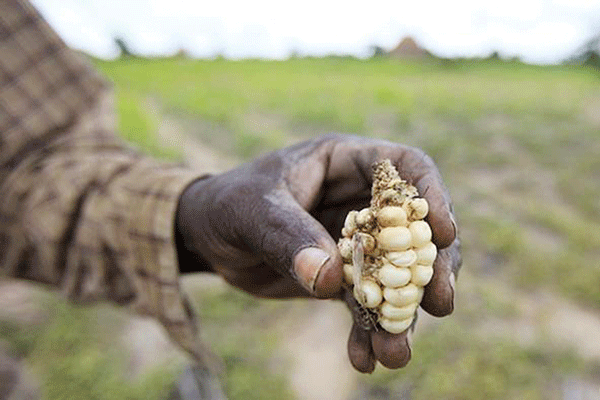
HUNGER has stalked hundreds of families in the Matabeleland region who relied mostly on remittances from migrant workers in South Africa and Botswana after borders were closed due to the coronavirus outbreak.
By Richard Muponde
This comes amid reports by the Zimbabwe Human Rights Commission that most rural communities were also facing a humanitarian crisis as food supplies have been cut short due to the national lockdown, which has forced some suppliers to stop deliveries in remote areas. The commission, in a statement yesterday, said it had received reports of acute food shortages in remote areas as food supplies have been cut amid strict movement measures imposed by the government The injivas are now unable to send money or food back home through omalayitsha due to the lockdown in both neighbouring countries.
Bulilima West legislator Dingimuzi Phuti yesterday confirmed the sorry situation facing the region and asked for food aid to help those in need.
“The situation is dire. My fear is that there are thousands of Zimbabwean citizens in South Africa who rely on medical supplies from their relatives here through the transport facility offered by omalayitshas. This poses a threat of defaults. Now that cross-border transporters are not working, life has similarly gotten torrid for our villagers who relied on their services,” he said. Phuti said the situation was made dire by the fact that breadwinners were not working in neighbouring countries because of the lockdowns.
“What makes it worse is that the breadwinners are also not working under this lockdown and so have nothing to send home. Instead, most are looking for help from home as life has become tougher in South Africa. This situation has seen predators emerging again, the shop owners, who have unreasonably pushed up prices for no reason,” he said.
Tsholotsho South legislator Zenzo Sibanda said the district was facing an acute shortage of food and water.
Hwange West legislator Godfrey Dube said residents of Victoria Falls were the most affected due to the closure of tourist facilities while villagers’ crops were being destroyed by wildlife.
- Chamisa under fire over US$120K donation
- Mavhunga puts DeMbare into Chibuku quarterfinals
- Pension funds bet on Cabora Bassa oilfields
- Councils defy govt fire tender directive
Keep Reading
“Hwange West, which covers Victoria Falls and its surroundings with a radius of 95km, mainly thrives on tourism economically, hence tourism has been the most affected due to COVID-19. The food situation is bad, mealie-meal supplies are erratic. We have two major supermarkets, namely OK and Pick n Pay, and three wholesalers Gains, OK Mart and Zapalala. My wish, as the local leader, is that they (shops and wholesalers) should get supplies at the same time so that we avoid queues as people are forced to go and queue for mealie-meal as early as 12 midnight, which is not right,” he said.
Dube said they were currently engaging suppliers to improve deliveries.
Dube added: “… we are grateful to organisations like World Vision, which have come on hand. But most people are facing hunger, their crops have been destroyed by elephants.”
Nkulumane legislator Kucaca Phulu also said there were food shortages in his constituency and Bulawayo as a whole.
“The food situation in Nkulumane is dire. It was already dire for many people before the COVID-19 crisis, many families just don’t have the income to sustain themselves as they are not employed and the prices keep shooting through the roof,” Phulu said
“The onset of COVID-19 has exacerbated the problem as even those who relied on their relatives sending foodstuffs and cash from South Africa and the diaspora have been disrupted by the crisis. Only a strong economy can ride out of a crisis such as this one and the government’s failure on the economic front is the biggest multiplier of the COVID-19 crisis.”











